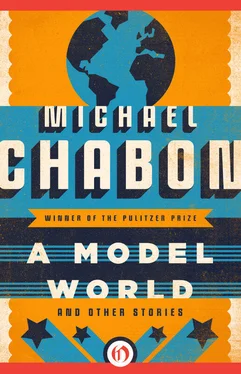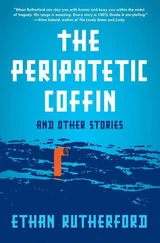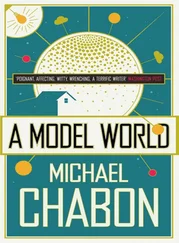Michael Chabon - A Model World And Other Stories
Здесь есть возможность читать онлайн «Michael Chabon - A Model World And Other Stories» — ознакомительный отрывок электронной книги совершенно бесплатно, а после прочтения отрывка купить полную версию. В некоторых случаях можно слушать аудио, скачать через торрент в формате fb2 и присутствует краткое содержание. Год выпуска: 2011, Издательство: Open Road Media, Жанр: Современная проза, на английском языке. Описание произведения, (предисловие) а так же отзывы посетителей доступны на портале библиотеки ЛибКат.
- Название:A Model World And Other Stories
- Автор:
- Издательство:Open Road Media
- Жанр:
- Год:2011
- ISBN:нет данных
- Рейтинг книги:5 / 5. Голосов: 1
-
Избранное:Добавить в избранное
- Отзывы:
-
Ваша оценка:
- 100
- 1
- 2
- 3
- 4
- 5
A Model World And Other Stories: краткое содержание, описание и аннотация
Предлагаем к чтению аннотацию, описание, краткое содержание или предисловие (зависит от того, что написал сам автор книги «A Model World And Other Stories»). Если вы не нашли необходимую информацию о книге — напишите в комментариях, мы постараемся отыскать её.
A Model World And Other Stories — читать онлайн ознакомительный отрывок
Ниже представлен текст книги, разбитый по страницам. Система сохранения места последней прочитанной страницы, позволяет с удобством читать онлайн бесплатно книгу «A Model World And Other Stories», без необходимости каждый раз заново искать на чём Вы остановились. Поставьте закладку, и сможете в любой момент перейти на страницу, на которой закончили чтение.
Интервал:
Закладка:
Dr. Shapiro walked over to the man with silver hair and gestured at his car. The man nodded politely but didn’t smile. Beside him their father looked small, wet, bald, and faintly sloppy, and the fluttery hand he held out toward the vaulting fender of the car seemed to try — and fail — to grasp, to clutch. The playboy said something and then looked away again. Nathan saw in that instant that his father was a man whom a playboy would shun. Then a woman carrying shopping bags came toward the men — a television blonde, wearing an ash-gray trenchcoat and lots of makeup; she was very tall, with beautiful teeth. She twirled her umbrella over her head and it shot drops around her like a firework of water.
“An actress,” said Ricky, pinching Nathan’s arm.
The playboy nodded again to Dr. Shapiro, then went around to open the door for the actress, who gave the playboy a look that Nathan recognized. He had seen his mother give this look to Chuck, and she had no doubt once given it to his father — this look which, now that he recognized it, seemed to convey everything that, Nathan imagined, constituted sexual desire, a look of soft, distrustful frankness, wide- and wet-eyed. And then they got in and drove away, the car sweeping out of the parking space and into the street without a sound, without a squeal, like a sailboat.
“You lied,” said Ricky. “It does go.”
“Look at Dad,” said Nathan.
Dr. Shapiro stood watching the fabulous car disappear for a moment, wiping the rain from his glasses, his head slightly turned away, as though he were listening to the couple’s dwindling laughter.
“He’s only a psychiatrist,” said Ricky.
“Here he comes,” said Nathan. He grabbed Ricky and pulled him into the board-game aisle. When their father came in, he was soaking wet, and he bought his sons several bright things that they had not asked for.
That night in the motel room, as he lay beside his brother, Nathan listened to the people sleeping around him; Ricky snored delicately. Nathan could hear the hum of the ice machine in the corridor, could hear his father’s wristwatch ticking on the night table, and the general, half-imaginary murmur that all motels emit at night. Anne had drawn the curtains; the room was so completely black that Nathan began to see bright colors, luminous Persian rugs. Lately he suffered from night anxieties, and although he would think and think about everything in his life that might be upsetting him — library fines, his recent failure to pass the parallel-bars exam, his fear of high school — he couldn’t determine what it was that kept him awake, with a stomach ache, night after night. It was as though he were trying to remember the answer to one of his father’s questions. He rolled onto his back, the motel sheets crackled, and, after a while, he began to drift, and the colors faded from his eyes. Ricky coughed in his sleep once, angrily. Then, in the instant before Nathan went under, a picture came into his mind. He lay like Moses in a little basket, floating among the bulrushes, and his parents stood on the bank above him, their arms around each other’s waists, looking down. They were singing to him. “We love you,” they sang.
The Halloween Party
WHENEVER NATHAN SHAPIRO REGARDED Eleanor Parnell, it was like looking at a transparent overlay in the World Book Encyclopedia . In his mind he would flip back and forth from today’s deep-voiced, black-haired, chain-smoking, heavy-breasted woman in a red sheath dress or tight dungarees, gracefully working the cork from another bottle of pink California wine, to the vague, large, friendly woman in plaids who had fed him year after year on Cokes and deviled-ham sandwiches, whose leaves he had raked for seven autumns now, and who still lay somewhere underneath the new Eleanor, like the skeleton of a frog beneath the bright chaos of its circulatory system.
It was only since Nathan had turned fourteen and found himself privy to the reckless conversation of divorcées — of those half-dozen funny, sad women with whom his mother had surrounded herself — that he had discovered Eleanor Parnell to be a woman of bad habits and of enterprises that ended in disaster. They said that she baked and consumed marijuana desserts, and that she liked to spend Christmas Eye playing blackjack in Las Vegas, alone. She drove her scarlet Alfa Romeo with the abandon of someone who, as Mrs. Shapiro pointed out, had always been very unlucky.
When she was hardly older than Nathan was now, Eleanor had spent two triumphant years on the L.P.G.A. tour; then she’d fallen from a horse and broken her left elbow. Nathan had seen her trophies once, in a glass cabinet up in Eleanor and Major Ray’s bedroom. Her real-estate company went down under a hailstorm of lawsuits and threats of criminal prosecution, which Nathan and his mother had read about in the Huxley New Idea and even, eventually, in The Washington Post . Cayenne, her New Orleans — style restaurant in Huxley Mall, closed after only a few months. And there had been a pale little baby, a redhead named Sullivan, who lived so briefly that Ricky, Nathan’s little brother, did not even remember him.
All these tales of misfortune, all the melancholy under Eleanor’s eyes and around her mouth, had the surprising — to Nathan — effect of causing him to fall helplessly in love. It began one August when, after a hiatus of several years, he resumed his ancient habit of visiting the Parnells’ house every day, for soft drinks and conversation with Eleanor. He was driven to her, at first, simply by loneliness and by the sadness of boredom. Ricky was gone — he had gone to live in Boston with their father the previous spring — and during the tedious, spectacular afternoons of August the house was distressingly empty. All month, Mrs. Shapiro, who was a nurse, had to work late on the ward, so Nathan ate dinner with his friend Edward St. John and Edward’s bohemian family more often than usual, and he was glad to spend the last afternoons of the summer down the street at the Parnells’. Major Ray — Major Raymond Parnell, of Galveston, Texas — did not get home from the base until seven o’clock, and Nathan would sit in the kitchen until Major Ray’s boisterous arrival, watching Eleanor smoke cigarettes and squeeze lemons into her diet Coke, of which she drank sixty ounces a day — enough, as Major Ray often declared, to reanimate a dead body. She would ask Nathan for his opinions on hair styles, decorating, ecology, religion, and music, and he would offer them only after a good deal of consideration, in an airy, humorous, pedantic tone of voice, which he borrowed, without knowing it, from his father. Eleanor had treated him without condescension when he was a little boy, and she now listened to him with an intentness that was both respectful and amused, as though she half expected him to tell her something new.
Nathan’s love for Eleanor followed hard on the heels of his long-awaited and disastrous growth spurt, and it wrenched him every bit as much, until his chest ached from the sudden and irregular expansion of his feelings. In the mirror the sight of his heavy-rimmed eyeglasses and unfortunate complexion; of the new, irregular largeness of his body, of his suddenly big — his fat — stomach, would send him off on giddy binges of anxiety. He ate sweet snacks and slept badly and jumped at loud sounds. The sight of Eleanor’s red Alfa Romeo — the sight of any red car — disturbed him. He was filled with deep compassion for animals and children, in particular for Nickel Boy, the Parnells’ dog, a sensitive, courtly old beagle. In fact, Nathan spoke at length to Nickel Boy about his feelings for Eleanor, even though he knew that talking to a dog was not really talking but, as he had read in Psychology Today , simply making a lot of comforting sounds in order to secrete some enzyme that would lower his own blood pressure and slow his pulse.
Читать дальшеИнтервал:
Закладка:
Похожие книги на «A Model World And Other Stories»
Представляем Вашему вниманию похожие книги на «A Model World And Other Stories» списком для выбора. Мы отобрали схожую по названию и смыслу литературу в надежде предоставить читателям больше вариантов отыскать новые, интересные, ещё непрочитанные произведения.
Обсуждение, отзывы о книге «A Model World And Other Stories» и просто собственные мнения читателей. Оставьте ваши комментарии, напишите, что Вы думаете о произведении, его смысле или главных героях. Укажите что конкретно понравилось, а что нет, и почему Вы так считаете.












